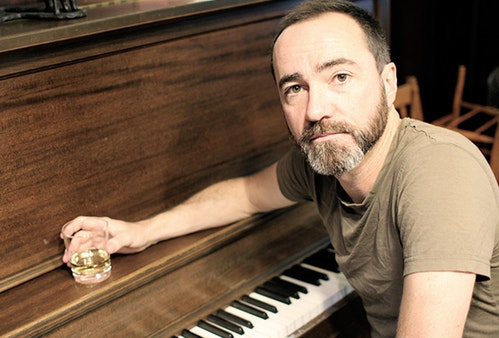The Shins w/ Baio
The Shins
Baio
Sun, November 5, 2017
Doors: 7:00 pm / Show: 8:00 pm
The Capitol Theatre
Port Chester, NY
$45 // $65 (ADVANCE) $50 // $70 (DAY OF SHOW)
TICKETS
This event is 18 and over
This event will have a general admission standing room only floor and a reserved seated Loge and Balcony. Reserved Loge and Balcony tickets will NOT have access to the general admission floor.
The Shins are a multiple GRAMMY nominated American band formed by James Mercer in Albuquerque, NM in 1996. After a few years of self-financed singles, demos and van tours, the band was signed by Sub Pop Records who subsequently released its first three full length records.
Their debut full length, Oh, Inverted World caused a seismic shift in the indie rock world upon its release in 2001, singlehandedly ushering in the modern era of the genre. Moved by the strength of verifiably life changing songs like “New Slang”, “Know Your Onion” and “Caring is Creepy,” a generation of artists ditched the previous decade’s lo-fi aesthetic in favor of Oh, Inverted World’s emphasis on melody. Selling nearly a million copies and featuring heavily in the cult classic Garden State, the influence of Oh, Inverted World continues to be as profound as it is wide-reaching.
The Shins released their sophomore record, Chutes Too Narrow in 2003. The album garnered near-perfect reviews from The New York Times, MOJO, Rolling Stone, and Q, among numerous others solidifying The Shins’ iconic standing.
The band’s third LP 2007, the epic Wincing The Night Away, debuted at #2 on the Billboard Top 200 moving more than 100,000 copies in its first week of release, and saw their Saturday Night Live debut and a second GRAMMY nomination, once again reaffirming The Shins’ stature as one of the most significant acts of the new millennium.
The fourth Shins album, Port of Morrow, was released in 2012 on James Mercer’s own Aural Apothecary label in partnership with Columbia Records. Preceded by “Simple Song,” the highest charting Shins single to date, Port of Morrow debuted at #3 on the Billboard Top 200 and was met with rave reviews: Entertainment Weekly declared it “the band’s best album in almost a decade” and Pitchfork described it as a “triumphant return.”
Heartworms, the band’s fifth album, will be released March 10th via Aural Apothecary/Columbia Records. The record will be supported by a world tour on which Mercer will be joined by Yuuki Matthews (bass), Jon Sortland (drums), Mark Watrous (guitar, keys, vocals), Casey Foubert (guitar) and Patti King (keys).
Bronxville, New York lies about 15 miles north of Manhattan, a small, prosperous community largely made up of professionals, finance-workers, lawyers. Growing up here, Chris Baio’s life followed the trajectory familiar to many suburban teenagers — a progression of piano lessons, bad pop-punk bands, getting drunk in the park, one eye forever trained on the city beyond.
It was years – not until 2009, in fact, by which time Baio was 24, that he learned that the iconic American author Don DeLillo was also a resident of Bronxville. Struck by the proximity to a writer he greatly admired, by the simple knowledge that “there had been a great artist in my midst”, over the course of three months Baio set about reading all of DeLillo’s books — among them Libra, Underworld and The Names, his 1982 novel about an American living in Greece, to which Baio felt a particular connection. “And I just realized,” he says, “that if I were ever going to make a solo album I would want to call it The Names.”
Since 2006, Baio has been best known as the bass-player in Vampire Weekend, the New York-based rock band who last year won a Grammy for their third album, Modern Vampires of the City. In his downtime between tours, however, Baio recognized in himself an increasing restlessness, a desire to explore his own individual voice away from the band.
He describes The Names as “a realization of my influences and things that I love” — a world quite distinct to that of Vampire Weekend. Those influences do of course emerge in bass-playing, and surfaced on an earlier EP, Sunburn (2012), but what is striking about Baio’s first solo collection is its marked difference to his work with the band.
Across its nine tracks, Baio wanted to return, in part, to the electronic music he had enjoyed while DJing at college, but also to investigate his own lyrical and vocal style to create something quite new and not easily categorized. “What I wanted to feel with this record was that it’s not a band record, it’s not a solo record and it’s not a producer record, but a combination of all three. I wanted to create a space where almost anything could happen,” he says.
In the making of The Names, Baio explored ideas of space — of belonging, identity and finding a place in the world. Some of this was occasioned by his own geographical shift — he and his wife relocated from New York to London in 2013, and he found himself struck by his new city’s expanse of sky, green space, globalness — elements that seem to infuse this record.
He began writing these songs at the tail end of that year, and in some ways they were a continuous point in a transient period of his life. “I would be home from the Vampire Weekend tour, I would make maybe two rough instrumentals and then I would take those instrumentals back with me on tour,” he recalls, “traveling around listening to them, trying to write melodies, trying to write lyrics.”
At that point the album was still something of a riddle to him, a conundrum of sorts. “I find working on music there’s the initial blast of inspiration and then after that it’s like solving a puzzle,” he explains. But what was certain, even in the album’s infancy, was that he wanted The Names to be a record that was compact and intense and vital, hovering around the 40 minute mark, as many of his favorite Roxy Music or Can albums were. He also wanted the songs to show something of a narrative progression, “So it starts in a darker place,” he says, “and ends with sweet love songs.”
He also wanted it to show the diversity of his tastes, to be a musically rich and variegated collection of songs. He uses, as an example, the way that the track I Was Born in a Marathon “suddenly goes from this banging techno into almost like an explosion, almost like I blew up the first two minutes of that track and then it drops down to acoustic guitar.” Or how he experimented with his vocal delivery, trying different ways to use his voice for different tracks, “like if you had a producer-led record you would have different vocalists.”
There are “straight-up love songs” here, as well as songs that nod to Dostoyevsky, Kurosawa, Iggy Pop, The Cars; there’s a track Baio describes as “a classic rock band arrangement, throwback pop song” and a “tribute to David Bowie and Bryan Ferry.”
There are more sober moments too: thoughts on political unease and depression, on military drones, and lyrics in which he finds himself “questioning what the relationship is between me and my government, on the things I might not agree with but that are being done in the name of my protection.” On the album opener, Brainwash yyrr Face (its title a nod to Exit Through the Gift Shop) Baio looks at “the connection between electronic music and substance abuse” because, he explains, “There are plenty of great fun party songs about getting fucked up, but what I wanted to do was make a banging electronic track about the darker side, the shame in getting too drunk.”
He talks with particular affection about the album’s penultimate song, Endless Rhythm, begun one “beautifully, unseasonably warm weekend last year in March” when Baio went to visit Tate Modern and found himself captivated by a Robert Delaunay painting. “I loved the color, loved the design, loved the curves of it,” he remembers. “And I probably spent 10 minutes staring at it before I noticed it was called Endless Rhythm. And I thought that’s very fucking cool: a musical title to a painting. It immediately connected with me.”
The resulting song, he says, is “a song about itself, a song about writing a song. It’s kind of about the relationship between people and art, about the process of making a record, where there’s a part in the middle where it’s really frustrating, the idea of waiting for this song to come.” And it did, he adds, take some time to come. “I would work on it, and maybe two months later I would go back to the Tate and stand in front of that painting, listening to the song with my headphones on, seeing if I could get further connected with it.”
And of course there is a further nod or two to Don DeLillo — I Was Born in a Marathon, for instance references the opening line from Underworld: “He speaks in your voice, American, and there’s a shine in his eye that’s halfway hopeful.”
But Baio has felt DeLillo’s voice winding around his own in more subtle ways, too. “There’s some things about language that I find very influenced by him,” he says. “The way that he puts certain words together, repeats phonetic sounds. The music of language has always interested me; that’s why I love two-syllable titles, because a one-syllable word is a monotone, but the quickest way to get to a melody in language is two syllables. That’s why I called it The Names, because it was strong and evocative, and it had music.”
Event Location and Ticket Information
The Capitol Theatre
149 Westchester Avenue
Port Chester, NY 10573
Handicap Accessible? Yes
Date: Sunday, November 5, 2017
Times: 7:00 pm - 11:30 pm
Ticket pricing:
Get tickets now
$65 - Loge
$45 - General Admission
$45 - Balcony

